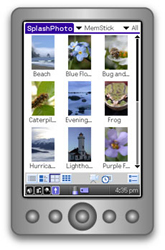|
Splash Photo
v4.05 for PalmOS
Reviewed
by: Lianne
Reitter, send
e-mail
Published
by: SplashData,
Inc., go
to the web site
Requires: Windows
95, 98, ME, NT4, 2000 or XP, supports all handheld
models running Palm OS 3.5 or later that are
capable of displaying 16-bit images; supports
standard (160x160), Hi-Res (320x320) and Hi-Res+
(320x480) displays; 230KB of free memory for
the application and 30KB per image; MacOS version
to be released in September 2003
MSRP: $29.95
SplashPhoto
for Palm OS allows PDA users to view and display images
on-the-go. The software is supplied as two main components:
the PalmOS application and a desktop PC catalog and
syunchronization conduit with which you can crop or
edit those images, add or delete images from the different
SplashPhoto catalogs you create and then load them
onto your handheld device. |
 |
Adding
an photo to your catalog is as simple as drag & drop
(for users of iPhoto) or selecting photos stored on your
hard drive. You can choose JPG, GIF and BMP image files,
but SplashPhoto will convert them all to JPG.
SplashPhoto
also provides some basic editing functions. Renaming photos
something other than DSC0000123 is always a good start,
but through the SplashPhoto Edit Dialog you can crop, adjust
brightness and contrast, rotate and choose whether you
want your file uploaded in your PDA’s native screen
dimensions or the dimensions of the original file. I recommend
you stick with your screen’s native resolution because
large files take up more space on your handheld than is
necessary. Another nice thing about using the smaller size
is that in the Edit Dialog you can zoom in on your photo
and scroll around to get the perfect crop.
Once you've
organized your photos, the only thing left to do is to
sync. Be forewarned that all the photos in
your catalog will be uploaded to the PDA along with their
assigned categories, so don’t go loading all 300
shots you took at the beach this summer into your SplashPhoto
Catalog, expecting only the ones selected in the “Sunset” category
to make it to your handheld. Nope. The catalog is really
the desktop representation of what files are going up to
the handheld and what they will look like. If you don’t
want a picture on your handheld anymore, you can delete
it directly from the device, but unless you also delete
it fromthe desktop catalog, you are going to upload it
again at your next HotSync.
You can view
the different photo categories on your PDA in a similar
manner to that of the SplashPhoto Desktop.
List View will give you the file name, it’s assigned
category and file size, etc., while Detail View gives you
the same information with a little thumbnail of the photo.
Thumbnail View will display large thumbnails and Gallery
View displays small ones. You can view your different categories
via a dropdown menu on the top right corner of the display.
Tap the picture you want to see and it will load. If you
chose to keep your picture in its native resolution you
will also have some simple zoom features at your disposal
via the Options menu.
Now what would
an image viewer be if it didn’t offer
a slideshow function? Well not much of one, so I’m
happy to report that SplashPhoto does a fine job at slideshows.
A little icon at the bottom of the SplashPhoto screen allows
you to start the slideshow and another icon provides configuration
options for the duration each picture is on screen and
whether or not your shots show up in chronological or random
order. You can also configure the slideshow to start whenever
you put your device in its charger. This is probably my
favorite feature as it really brightens up an otherwise
dull office desk.
Cons: Image loading is a bit slower than the competition,
apparently resulting from very little prefetching or caching
of stored image data or headers. Be careful of your image
dimensions - SplashPhoto does better with sizes closer
to native PDA resolutions. Limited zoom functionality.
Non-intuitive desktop catalog functionality.
Pros: Smooth operation, intuitive controls in the Palm
program, excellent image quality. Store photos in device
memory or expansion card. We looked at SplashPhoto on a
Sony Clie PEG-N760C and a Palm Zire 71. We discovered that
the Zire 71's built-in camera functioned automatically
with SplashPhoto - very nice. The Clie display looked quite
good running SplashPhoto, but the superb Zire screen really
allows SplashPhoto to shine. Nifty product featuring excellent
integration with PDA camera hardware. Recommended.
Letters to the Editor are welcome and occasionally abused in public. Send e-mail to: whine@kickstartnews.com
|

|

